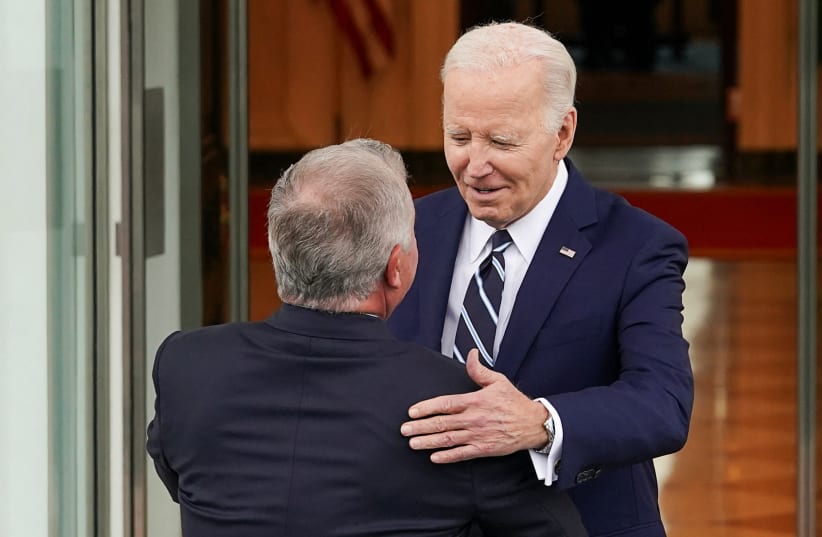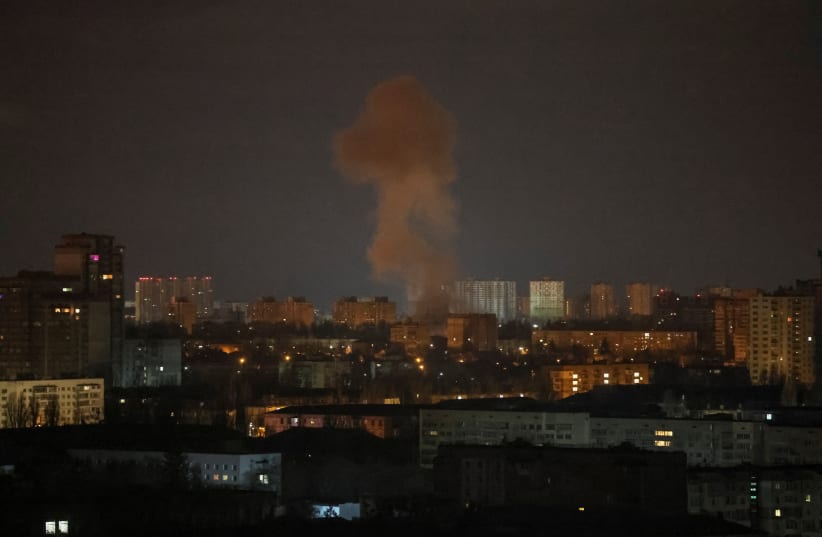"Behold, I will make Jerusalem a cup oftrembling STONG’S NUMBER: 7478 a reeling (from intoxication):—trembling.unto all the people round about,when they shall be in theseige STONG’S NUMBER: 4692 matsuwr, maw-tsoor´; from 6696; something hemming in, i.e. (objectively) a mound (of besiegers), (abstractly) a siege, (figuratively) distress; or (subjectively) a fastness:—besieged, bulwark, defence, fenced, fortress, siege, strong (hold), tower.both against Judah and against Jerusalem.” — Zechariah 12:2
Article Source: Haaretz
With two tense weeks remaining until the end of Ramadan, Hamas is playing a duplicitous game by stoking Jerusalem flames and permitting rocket fire from Gaza – all the while saying it doesn’t seek escalation
The longer the tension in Jerusalem and the West Bank continues, the more apparent becomes the duplicitous game played by Hamas leaders. While the organization has become more dominant in leading the incitement and fomenting violence on Jerusalem’s Temple Mount, it seems it is also giving more slack to smaller Palestinian factions in the Gaza Strip, which have returned to a nightly drizzle of rocket fire aimed at communities close to the border, following a long period of quiet.
Despite the accelerated pace of incidents, there has so far been no direct collision between Israel and Hamas, with the latter continuing to transmit messages indicating its wish to avoid escalation in the Gaza Strip. And yet, it appears that Israel will find it hard to prevent a wider conflagration if the number of casualties rises, especially around Temple Mount.
Israel has for years been adopting a declared policy of distinguishing between the West Bank and Gaza. However, Hamas punched a big hole in Israel’s strategy last May with the rockets it launched toward Jerusalem following tension in the city, creating an impression of a united Palestinian struggle that includes Arab residents of East Jerusalem. The organization chalked up another gain on the backdrop of the tempestuous riots in mixed Jewish-Arab cities within the 1967 borders. Part of what we’ve seen over the last few weeks is an attempt by Hamas to reconstruct last year’s achievement.
The ongoing conflagration on the Temple Mount makes this easier for Hamas. A dangerous mixture of fake news dissemination on the Palestinian side, along with provocations by Israel’s extreme right keep the flames stoked. Two days ago there was a serious incident on the mountain, when a young Palestinian was gravely injured during a clash with policemen. According to the police, the man tripped and hit his head. Palestinians say he was hit by a sponge-tipped bullet fired at close range. It’s clear to anyone following the events in Jerusalem that if the man dies, things will get worse.
The latest Flag March, followed by the wounding of the demonstrator, served as a pretext for the firing of a few rockets from Gaza over the last few nights. The first one was by Islamic Jihad activists, ordered by that organization’s senior [overseas] officials.
The subsequent rockets were fired by local activists from that organization. Israel’s defense establishment believes that these launchings were not carried out with the blessing of Hamas, noting that Hamas security forces arrested dozens of Islamic Jihad activists after the rockets were fired. Hamas also sent messages to Israel, through Egyptian intelligence officers serving as mediators, indicating that it was not interested in an escalation. However, one should remember that Israel’s intelligence services often claim that Hamas does not want rockets to be fired, only to have these claims upended by reality.
- Al-Aqsa won’t become a synagogue. There are real reasons to fight the occupation
- For Israeli and Palestinian extremists, Jerusalem’s holiest site is just an excuse
- Israel’s cap on ‘Holy Fire’ ceremony sparks ire among Christians
The IDF first responded to this rocket fire by aerial strikes against military sites belonging to Hamas, arguing that the organization is responsible for everything that happens in the Gaza Strip, even if other factions are the ones firing rockets. In one case, a site serving for producing rocket propellants was attacked and destroyed, possibly impacting Hamas plans for increasing its military capabilities.
Another sanction was imposed on Saturday: Israel will halt all entry of Palestinian workers and merchants from Gaza for an unlimited period of time. This affects 12,000 people whose economic contribution to the Gaza Strip is immense. The hope in political and military echelons is that this economic blow will urge Hamas to take more extensive steps to restrain and punish activists from Islamic Jihad and other factions if the rocket fire continues. Over the last month, Israel’s government adopted the opposite stance. It refrained from collective punishment in the territories, arguing that enabling the Palestinians to continue to work in Israel would curb the violence. Now, punitive measures are being taken specifically against the Gaza Strip, which may attest to concerns in Jerusalem over the renewal of daily attacks against communities along the Gaza border.
On all fronts, the government is making great efforts to restore calm. More than during the previous government’s tenure, early planning was evident in the adoption of extensive measures to ease the situation in Gaza, in the relatively restrained police policy on the Temple Mount and in the neutralization of a potential landmine by postponing the eviction of Palestinians from their homes in Sheikh Jarrah in East Jerusalem. Even now, there is an effort to manage the situation in an orderly manner, without extremist and inflammatory rhetoric. Two tense weeks, at least, remain until the end of Ramadan, capped by Eid al-Fitr celebrations, as well as Israel’s Memorial Day and Independence Day.
So far, Prime Minister Naftali Bennett can chalk up a mixed result. Despite the wave of terror that began last month and the tension in Jerusalem, there has been no massive turning to violence among West Bank Palestinians, and no significant involvement of Israeli Arabs in recent clashes. But just like his predecessor Benjamin Netanyahu one year ago, Bennett is walking on thin ice. His coalition is on the verge of collapse and the security crisis, if exacerbated, could give it the final shove into the abyss.




